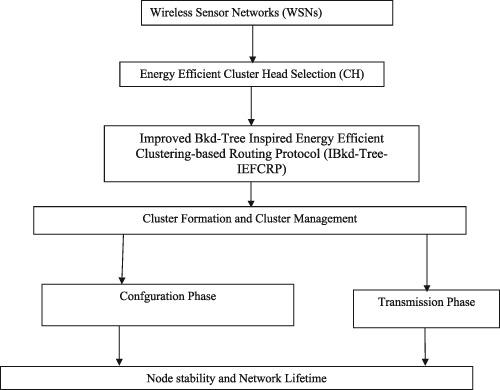当前位置:
X-MOL 学术
›
Int. J. Commun. Syst.
›
论文详情
Our official English website, www.x-mol.net, welcomes your
feedback! (Note: you will need to create a separate account there.)
An Energy‐Proficient Clustering‐Inspired Routing Protocol using Improved Bkd‐tree for Enhanced Node Stability and Network Lifetime in Wireless Sensor Networks
International Journal of Communication Systems ( IF 1.7 ) Pub Date : 2020-08-11 , DOI: 10.1002/dac.4575 Sengathir Janakiraman 1 , Deva Priya M. 2
International Journal of Communication Systems ( IF 1.7 ) Pub Date : 2020-08-11 , DOI: 10.1002/dac.4575 Sengathir Janakiraman 1 , Deva Priya M. 2
Affiliation

|
Energy conservation in Wireless Sensor Networks (WSNs) is essential for improving the stability of sensor nodes and network lifetime. An energy‐proficient clustering‐based routing protocol is necessary for efficient cluster formation and Cluster Head (CH) selection to sustain Quality of Service (QoS). In this paper, an Improved Bkd‐Tree‐Inspired Energy‐eFficient Clustering‐based Routing Protocol (IBkd‐Tree‐IEFCRP) is propounded as a potential strategy for guaranteeing significant cluster formation and management. It is proposed as an effective strategy in CH node allocation that handles the impacts of QoS during the process of data dissemination. This IBkd‐Tree‐IEFCRP is proposed to deal with energy saving with respect to data traffic by including a strategy of cluster formation which incorporates the benefits of partition data structure that incorporates an improved Bkd‐tree algorithm. It also concentrates on the process of CH selection by integrating a reactive approach that enhances throughput with minimized energy, delay and jitter. The simulation experiments of the proposed IBkd‐Tree‐IEFCRP confirm a better performance in improving the average throughput by 13.21%, reducing the energy consumptions by 12.96%, minimizing the delay by 11.98% and reducing the jitter by 14.24% when compared to the baseline k‐dimensional tree algorithm (kd‐tree algorithm), Weighting and Parameter Optimization‐based Energy‐Efficient Clustering Routing Protocol (WPO‐EECRP), Improved Clustering by Fast Search and Finding of Density Peaks (ICFSFDP), and Energy‐based Cluster Centered Routing Protocol (ECCRP) taken for comparison. The proposed IBkd‐Tree‐IEFCRP is also identified to reduce delay by 8.42% and jitter by 7.18% and increase throughput by 6.84% when compared to the benchmarked protocols for different number of rounds.
中文翻译:

使用改进的Bkd树的节能型集群启发式路由协议,可提高无线传感器网络的节点稳定性和网络寿命
无线传感器网络(WSN)中的节能对于提高传感器节点的稳定性和网络寿命至关重要。基于能量的基于群集的路由协议对于有效的群集形成和群集头(CH)选择,以维持服务质量(QoS)是必需的。本文提出了一种改进的Bkd树启发式节能群集路由协议(IBkd树IEFCRP)作为保证重要群集形成和管理的潜在策略。作为处理节点在数据分发过程中QoS的影响的CH节点分配的一种有效策略,提出了该方法。该IBkd-Tree-IEFCRP旨在通过包括集群形成策略来处理与数据流量有关的节能问题,该策略结合了分区数据结构的优点,该优点结合了改进的Bkd-tree算法。它还通过集成一种反应性方法来专注于CH选择的过程,该方法可在最小化能量,延迟和抖动的情况下提高吞吐量。所提出的IBkd-Tree-IEFCRP的仿真实验证明,与基线相比,可以将平均吞吐量提高13.21%,将能耗降低12.96%,将延迟最小化11.98%,并将抖动降低14.24%,具有更好的性能。 k维树算法(kdtree算法),基于权重和参数优化的节能集群路由协议(WPO-EECRP),通过快速搜索和发现密度峰(ICFSFDP)改进了聚类,并采用了基于能量的聚类中心路由协议(ECCRP)进行比较。与针对不同轮次的基准协议相比,建议的IBkd-Tree-IEFCRP还可以减少8.42%的延迟和7.18%的抖动,并提高6.84%的吞吐量。
更新日期:2020-10-05
中文翻译:

使用改进的Bkd树的节能型集群启发式路由协议,可提高无线传感器网络的节点稳定性和网络寿命
无线传感器网络(WSN)中的节能对于提高传感器节点的稳定性和网络寿命至关重要。基于能量的基于群集的路由协议对于有效的群集形成和群集头(CH)选择,以维持服务质量(QoS)是必需的。本文提出了一种改进的Bkd树启发式节能群集路由协议(IBkd树IEFCRP)作为保证重要群集形成和管理的潜在策略。作为处理节点在数据分发过程中QoS的影响的CH节点分配的一种有效策略,提出了该方法。该IBkd-Tree-IEFCRP旨在通过包括集群形成策略来处理与数据流量有关的节能问题,该策略结合了分区数据结构的优点,该优点结合了改进的Bkd-tree算法。它还通过集成一种反应性方法来专注于CH选择的过程,该方法可在最小化能量,延迟和抖动的情况下提高吞吐量。所提出的IBkd-Tree-IEFCRP的仿真实验证明,与基线相比,可以将平均吞吐量提高13.21%,将能耗降低12.96%,将延迟最小化11.98%,并将抖动降低14.24%,具有更好的性能。 k维树算法(kdtree算法),基于权重和参数优化的节能集群路由协议(WPO-EECRP),通过快速搜索和发现密度峰(ICFSFDP)改进了聚类,并采用了基于能量的聚类中心路由协议(ECCRP)进行比较。与针对不同轮次的基准协议相比,建议的IBkd-Tree-IEFCRP还可以减少8.42%的延迟和7.18%的抖动,并提高6.84%的吞吐量。











































 京公网安备 11010802027423号
京公网安备 11010802027423号